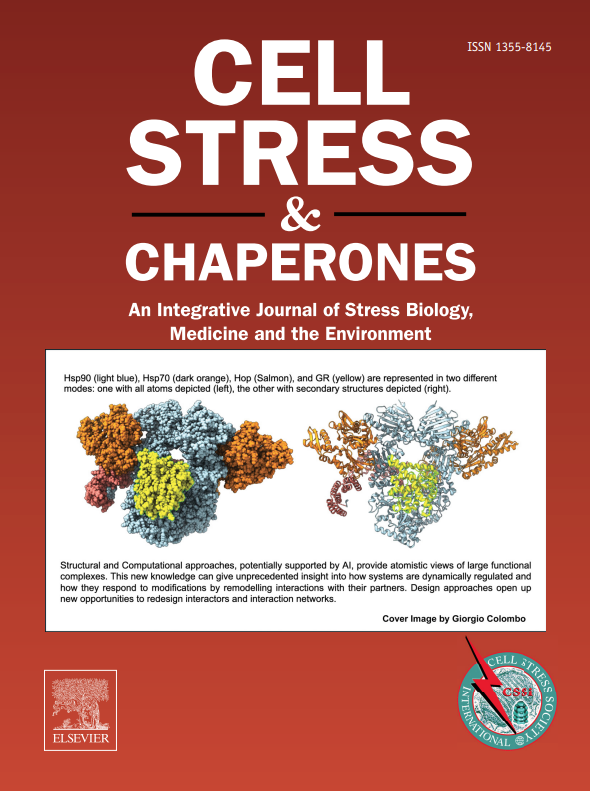CHOP通过下调自噬,加重内质网应激下肝细胞凋亡。
IF 3.2
3区 生物学
Q3 CELL BIOLOGY
引用次数: 0
摘要
背景:与内质网(ER)应激相关的细胞凋亡涉及多种肝脏疾病,包括肝纤维化、非酒精性脂肪肝和肝硬化。肝细胞通过引发未折叠蛋白反应(UPR)和增强自噬来应对ER应激。自噬是维持ER正常功能的关键机制,它通过降解受损的ER片段和清除ER腔中的异常蛋白质聚集体来实现。如果不能通过自噬恢复ER平衡,就会对肝细胞造成危害,并导致与ER应激相关的细胞凋亡。最近的研究结果表明,C/EBP同源蛋白(CHOP)可通过下调自噬作用加剧ER应激相关的细胞凋亡,但其潜在机制仍难以确定。目的:研究CHOP对ER应激诱导的大鼠肝细胞凋亡的影响及其潜在的分子机制:方法:用雷帕霉素(RAP)和 3-甲基腺嘌呤预处理 BRL-3A 细胞,然后用二硫苏糖醇(DTT)处理。分别使用实时细胞分析(RTCA)和流式细胞仪检测细胞的生长率和凋亡率。ER应激相关分子水平通过Western印迹法测定。使用 CHOP、小干扰 RNA 和慢病毒载体系统转染 BRL-3A 细胞,观察 CHOP 基因沉默或过表达对自噬和细胞凋亡的影响。染色质免疫共沉淀(ChIP)被用来确认CHOP是否直接与ER应激下的ATG12、ATG5和LC3启动子区域结合:结果:ER应激相关分子在BRL-3A肝细胞中急剧上调,肝细胞凋亡增加。RAP 预处理明显降低了 DTT 诱导的 ER 应激相关分子的表达;相反,3-MA 预处理促进了 DTT 诱导的 ER 应激相关凋亡分子的水平。随着肝细胞中 CHOP 表达的减少,自噬相关分子的水平急剧上升,DTT 诱导的肝细胞凋亡也随之减少。然而,在过表达 CHOP 的细胞中却观察到了相反的趋势。通过 ChIP 检测发现,DTT 处理后,CHOP 对 BRL-3A 细胞中的 ATG12、ATG5 和 LC3 等自噬相关分子有负向调节作用:结论:CHOP在ER应激过程中的增强抑制了自噬,促进了肝细胞凋亡;然而,CHOP基因表达的减少可减轻DTT诱导的肝细胞凋亡。过表达 CHOP 会加重 DTT 诱导的肝细胞凋亡。本文章由计算机程序翻译,如有差异,请以英文原文为准。
CHOP aggravates hepatocyte apoptosis upon endoplasmic reticulum stress by downregulating autophagy
Endoplasmic reticulum (ER) stress-induced apoptosis plays a crucial role in various liver diseases. Hepatocytes respond to ER stress by activating the unfolded protein response and autophagy, which is essential for maintaining ER homeostasis. However, failure to restore ER balance via autophagy contributes to apoptosis. In this study, we aimed to explore the role of C/EBP homologous protein (CHOP) in regulating ER stress-induced apoptosis in rat hepatocytes. We found that CHOP downregulates autophagy, aggravating apoptosis. Our results revealed that inhibition of CHOP expression enhanced autophagy and reduced DTT-induced apoptosis in BRL-3A cells, whereas CHOP overexpression worsened apoptosis. Chromatin immunoprecipitation assays revealed that CHOP negatively regulates autophagy-related genes, such as ATG12, ATG5, and LC3. These findings suggest that CHOP modulation plays a crucial role in ER stress-induced hepatocyte apoptosis by regulating autophagy.
求助全文
通过发布文献求助,成功后即可免费获取论文全文。
去求助
来源期刊

Cell Stress & Chaperones
生物-细胞生物学
CiteScore
7.60
自引率
2.60%
发文量
59
审稿时长
6-12 weeks
期刊介绍:
Cell Stress and Chaperones is an integrative journal that bridges the gap between laboratory model systems and natural populations. The journal captures the eclectic spirit of the cellular stress response field in a single, concentrated source of current information. Major emphasis is placed on the effects of climate change on individual species in the natural environment and their capacity to adapt. This emphasis expands our focus on stress biology and medicine by linking climate change effects to research on cellular stress responses of animals, micro-organisms and plants.
 求助内容:
求助内容: 应助结果提醒方式:
应助结果提醒方式:


